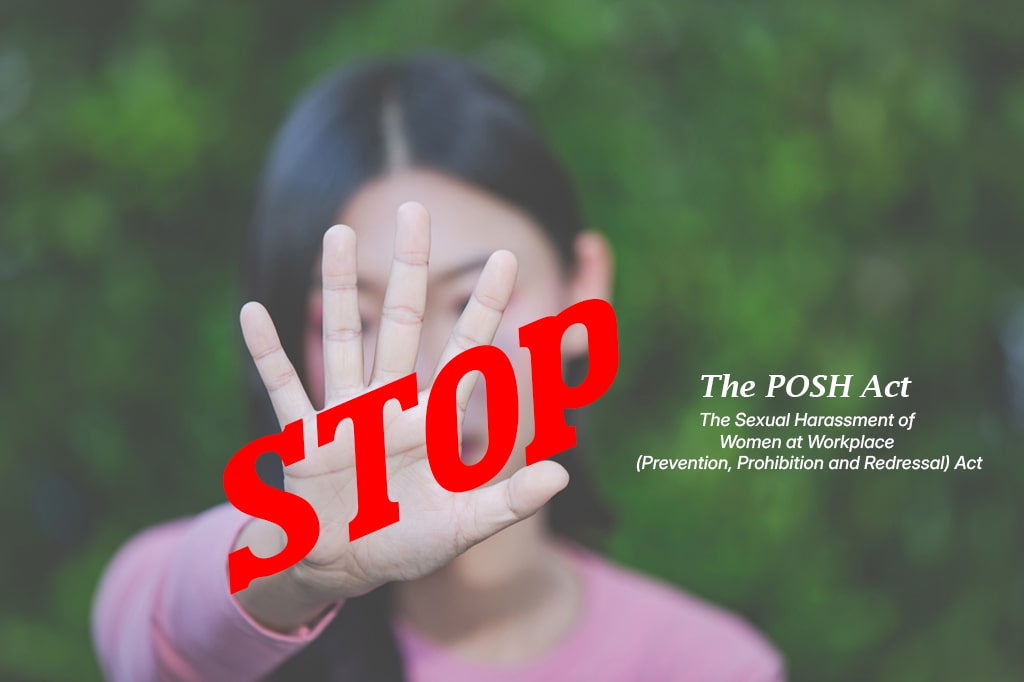In today’s progressive corporate landscape, ensuring a safe, respectful work environment is essential. The primary goal of the POSH Act is to protect women from sexual harassment at work and ensure they can work in a safe environment.
The POSH law makes it clear that every employee has the right to work without any fear or discomfort
Objectives
This Act is to provide :
- Protection against sexual harassment of women at workplace
- Prevention
- Redressal of complaints of sexual harassment
Recognizing Prohibited Conduct in the Workplace
Sexual harassment:
The Act in its Section 2n, defines sexual harassment. Sexual harassment includes any one or more of the following unwelcome acts or behaviour (whether directly or by implication), namely
- Physical contact or advances
- Asking for sexual favours
- Making sexually coloured jokes or comments
- Showing pornographic material
- Any unwelcome physical, verbal, or non-verbal conduct of a sexual nature
It is also considered sexual harassment if:
- Someone promises special treatment in return for sexual favours
- Someone threatens you with bad treatment if you refuse
- Someone makes you feel unsafe about your current or future job
- Your work is disturbed by a hostile or offensive environment
- You’re treated in a way that affects your health or safety
Employee Awareness under POSH Act
POSH awareness is very important as sexual harassment is a sensitive topic and employees must know what is acceptable and what is not in the workplace. It is important that the following topics are covered in the POSH training:
- Definition of sexual harassment.
- The message that the organization has a zero-tolerance policy towards any act of sexual harassment.
- Scope and applicability of the policy.
- Complaining mechanism and the contact details of Internal Committee Members Redressal process – formal and informal Rights and the protection provided to the complainant, respondent and witnesses in a sexual harassment case.
- Responsibility of the employer and employees in ensuring safety within the workplace.
- Employee and Employer according to POSH Act.
- Internal Committee, its responsibilities and the details of IC members.
- Process for filing a sexual harassment complaint.
- Punishments for sexual harassment.
- Consequences of filing a false complaint.
- Difference between an unsubstantiated complaint and a false complaint.
- Consequences of retaliation.
- Responsibilities of someone who has witnessed harassment.
- Responsibilities of employees in preventing sexual harassment in the organization.
- Twice the punishment that was awarded the first time and/or
- Cancellation or non-renewal of the business license.
Maintaining Confidentiality
- All complaint-related proceedings and identities must be kept in confidential
- Breach of confidentiality can lead to penalties.
Submission of Annual Report
POSH Act mandates that every organization that has ten or more employees should submit two reports every year:
- The Annual Report submitted by the Internal Committee to the Employer and the District officer.
- Directors’ Report to the ROC (if the organization is a Private Limited or Public Limited Company).
Annual Report submitted by the Internal Committee to the Employer and the District officer
Section 21(1) of the POSH Act states:
“21. Committee to submit annual report.— (1) The Internal Committee or the Local Committee, as the case may be, shall in each calendar year prepare, in such form and at such time as may be prescribed, an annual report and submit the same to the employer and the District Officer.”
The report should contain the following information:
- Number of sexual harassment complaints filed in the year.
- Number of complaints disposed of
- Number of cases pending for resolution for more than ninety days.
- Nature of the action(s) taken by the employer or the district officer and
- Number of workshops/awareness programs conducted by the employer to increase awareness about sexual harassment at workplace.
The POSH Act does not mention a deadline to file the report. However, it is ideal to submit the report for a calendar year by 31st January of the following year. The District Officer will prepare a brief report and forward it to the State Government after receiving reports from organizations and the LC.
Directors’ Report to the ROC
Section 22 of the POSH Act speaks about the employer submitting information in annual report.
“22. Employer to include information in annual report.— The employer shall include in its report the number or cases filed, if any, and their disposal under this Act in the annual report of his organisation or where no such report is required to be prepared, intimate such number of cases, if any, to the District Officer.”
This report is the organizational annual report filed by the employer every financial year. If the organization is obligated to file the Directors’ report every year, the employer should include the number of sexual harassment cases filed in a year and their disposal in the report.
In addition to what the POSH Act mandates, the Ministry of Corporate Affairs amended the Companies (Accounts) Rules 2014. The amendment mandates organizations to make a statement in the Director’s Report that the organization is compliant to the POSH Act. This applies to all organizations registered under ROC except small companies and one person companies as defined by Companies Act.
Role of External Member in POSH Compliance
The External member performs the following duties:
- Help the organization to be POSH compliant.
- Help in creating awareness of the Act among employees.
- Answer questions from the employees and IC members about the implementation of the POSH Act at workplace.
- Supervise the inquiry proceedings of sexual harassment complaints to ensure that inquiries are objective and follow principles of natural justice.
- Assist the IC members to prepare the minutes of the IC meetings and the inquiry proceedings and
- Assist the IC members to prepare the Annual Report.
Remuneration for External Member
The External Member is entitled to an allowance for holding the proceedings. This can be discussed by the employer and the External Member. The External Member is also allowed to claim for the reimbursement of the travel costs.
FAQ:
1)Can the Organization’s POSH Policy be gender neutral? Since the POSH Act protects only women against sexual harassment, can the organization’s POSH policy be gender neutral?
Yes. Organizations can still have a gender-neutral policy, that allows employee of any gender to file a complaint of sexual harassment with the IC. However, it is to be noted that when there is a sexual harassment complaint from a man or third gender, the powers granted to the Internal Committee will not be applicable. When the Internal Committee handles cases filed by a man or third gender, they can use the powers granted by the organization’s grievance redressal mechanism.
If the organization’s policy is not gender-neutral, the policy can include information about how it handles complaints from other genders. For example, a line that says “Refer to the Code of Conduct policy to know the process of accepting and redressing sexual harassment complaints by other genders” can be included in the policy.
2) Who is an aggrieved woman according to the Act?
According to the Act (Section 2a) aggrieved woman means in relation to a workplace, a woman of any age whether employed or not, who alleges to have been subjected to any act of sexual harassment by the respondent
- In relation to a dwelling place or house, a woman of any age who is employed in such a dwelling or house
3) What is the meaning of a respondent?
Respondent means a person against whom the aggrieved woman has made a complaint. (Section 2 m)
4) What Happens If a False Complaint Is Made?
The POSH Act discourages false or malicious complaints.
- If the Internal Committee (IC) concludes that a complaint was made with malicious intent or false evidence, disciplinary action may be taken against the complainant.
- However, inability to prove a complaint does not mean it was false.
The Act protects genuine complainants and also ensures fairness for all involved.
5) Is the Identity of the Complainant and Respondent Kept Confidential?
Yes. Confidentiality is a key requirement under the POSH Act.
- The names and details of the complainant, respondent, and witnesses must be kept confidential.
- Disclosure is punishable with a fine of up to ₹5,000.
The POSH Act helps to create a safe and respectful workplace for everyone. It reminds us that dignity, respect, and safety are not just rights; they are must-haves at work. Everyone has the right to be heard, valued, and protected at their workplace; this is what the POSH Act stands for.





